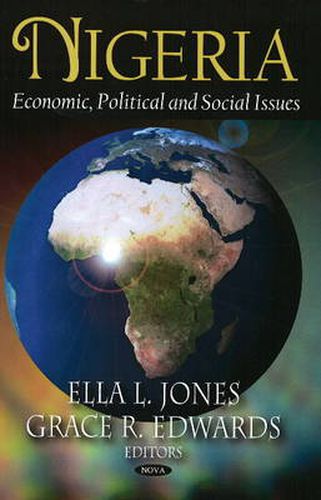Readings Newsletter
Become a Readings Member to make your shopping experience even easier.
Sign in or sign up for free!
You’re not far away from qualifying for FREE standard shipping within Australia
You’ve qualified for FREE standard shipping within Australia
The cart is loading…






The most populous country in Africa, Nigeria accounts for over half of West Africa’s population. Although less than 25% of Nigerians are urban dwellers, at least 24 cities have populations of more than 100,000. The variety of customs, languages, and traditions among Nigeria’s 250 ethnic groups gives the country a rich diversity. The dominant ethnic group in the northern two-thirds of the country is the Hausa-Fulani, most of whom are Muslim. Other major ethnic groups of the north are the Nupe, Tiv, and Kanuri. The Yoruba people are predominant in the southwest. About half of the Yorubas are Christian and half Muslim. The predominantly Catholic Igbo are the largest ethnic group in the southeast, with the Efik, Ibibio, and Ijaw comprising a substantial segment of the population in that area. Persons of different language backgrounds most commonly communicate in English, although knowledge of two or more Nigerian languages is widespread. Hausa, Yoruba, Igbo, Fulani, and Kanuri are the most widely used Nigerian languages. Nigeria is the United States’ largest trading partner in sub-Saharan Africa, largely due to the high level of petroleum imports from Nigeria, which supply 11% of U.S. oil imports–nearly 46% of Nigeria’s daily oil production. Nigeria is the fifth-largest exporter of oil to the United States. Total two-way trade was valued at $35 billion in 2007, a 17% increase over 2006. Led by machinery, wheat, and motor vehicles, U.S. goods exports to Nigeria in 2007 were worth $2.2 billion, up 25% from 2006. U.S. imports from Nigeria were $32.7 billion in 2007, up 17% from 2006. U.S. imports from Nigeria consisted predominantly of oil. However, rubber products, cocoa, gum arabic, cashews, coffee, and ginger constituted over $70 million of U.S. imports from Nigeria in 2007, up 45% from 2006. The U.S. goods trade deficit with Nigeria was $32.8 billion in 2007, a slight increase from 2006 data and representing the seventh-largest deficit for the United States with any country world-wide. Nigeria is currently the 50th-largest export market for U.S. goods and the 14th-largest exporter of goods to the United States. The United States was the largest foreign investor in Nigeria. The stock of U.S. foreign direct investment (FDI) in Nigeria in 2005 was $874 million, down from $2 billion in 2004. U.S. FDI in Nigeria is concentrated largely in the mining and wholesale trade sectors This new book presents a broad selection of research on important economic, political and social issues.
$9.00 standard shipping within Australia
FREE standard shipping within Australia for orders over $100.00
Express & International shipping calculated at checkout
The most populous country in Africa, Nigeria accounts for over half of West Africa’s population. Although less than 25% of Nigerians are urban dwellers, at least 24 cities have populations of more than 100,000. The variety of customs, languages, and traditions among Nigeria’s 250 ethnic groups gives the country a rich diversity. The dominant ethnic group in the northern two-thirds of the country is the Hausa-Fulani, most of whom are Muslim. Other major ethnic groups of the north are the Nupe, Tiv, and Kanuri. The Yoruba people are predominant in the southwest. About half of the Yorubas are Christian and half Muslim. The predominantly Catholic Igbo are the largest ethnic group in the southeast, with the Efik, Ibibio, and Ijaw comprising a substantial segment of the population in that area. Persons of different language backgrounds most commonly communicate in English, although knowledge of two or more Nigerian languages is widespread. Hausa, Yoruba, Igbo, Fulani, and Kanuri are the most widely used Nigerian languages. Nigeria is the United States’ largest trading partner in sub-Saharan Africa, largely due to the high level of petroleum imports from Nigeria, which supply 11% of U.S. oil imports–nearly 46% of Nigeria’s daily oil production. Nigeria is the fifth-largest exporter of oil to the United States. Total two-way trade was valued at $35 billion in 2007, a 17% increase over 2006. Led by machinery, wheat, and motor vehicles, U.S. goods exports to Nigeria in 2007 were worth $2.2 billion, up 25% from 2006. U.S. imports from Nigeria were $32.7 billion in 2007, up 17% from 2006. U.S. imports from Nigeria consisted predominantly of oil. However, rubber products, cocoa, gum arabic, cashews, coffee, and ginger constituted over $70 million of U.S. imports from Nigeria in 2007, up 45% from 2006. The U.S. goods trade deficit with Nigeria was $32.8 billion in 2007, a slight increase from 2006 data and representing the seventh-largest deficit for the United States with any country world-wide. Nigeria is currently the 50th-largest export market for U.S. goods and the 14th-largest exporter of goods to the United States. The United States was the largest foreign investor in Nigeria. The stock of U.S. foreign direct investment (FDI) in Nigeria in 2005 was $874 million, down from $2 billion in 2004. U.S. FDI in Nigeria is concentrated largely in the mining and wholesale trade sectors This new book presents a broad selection of research on important economic, political and social issues.